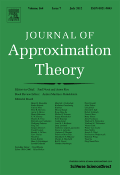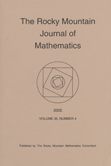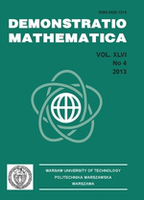
Dolomites Research Notes on Approximation
Scope & Guideline
Bridging Theory and Application in Mathematical Research
Introduction
Aims and Scopes
- Approximation Theory and Techniques:
The journal covers a wide range of topics in approximation theory, including polynomial approximation, interpolation methods, and convergence properties of various approximation operators. - Numerical Methods and Algorithms:
It emphasizes the development and analysis of numerical methods for solving mathematical problems, including integral equations, differential equations, and optimization techniques. - Special Issues and Celebratory Publications:
The journal features special issues dedicated to notable contributors in the field, showcasing their works and contributions, further enriching the academic discourse. - Applications in Various Fields:
Research published in the journal often explores applications of approximation techniques in fields such as engineering, physics, and data science, demonstrating the interdisciplinary relevance of approximation methods. - Statistical and Functional Analysis:
The journal includes studies that delve into statistical convergence, functional spaces, and their implications for approximation, highlighting the interplay between these areas.
Trending and Emerging
- Radial Basis Functions (RBF) and Their Variants:
There is an increasing focus on RBFs, particularly in contexts requiring high-dimensional data approximation and complex boundary conditions, showcasing their versatility in modern applications. - Machine Learning and Deep Learning Applications:
The intersection of approximation theory with machine learning techniques is gaining traction, where approximation methods are applied to optimize algorithms and improve model performance. - Statistical and Robust Methods in Approximation:
Emerging themes include the development of statistical approaches to approximation, emphasizing robustness and reliability in numerical solutions amidst uncertainty. - Advanced Hybrid Methods:
Research is trending towards hybrid methods that combine various approximation techniques, such as blending polynomial and spline methods, to enhance accuracy and efficiency. - Functional and Operator Theory:
There is a growing interest in the interactions between approximation theory and functional analysis, particularly in the study of operator semigroups and their applications in approximation contexts.
Declining or Waning
- Classical Polynomial Approximation:
While polynomial approximation remains a core topic, there appears to be a waning interest in classical approaches, with more focus shifting towards advanced techniques like radial basis functions and spline methods. - Applications of Traditional Numerical Methods:
There is a noticeable decrease in publications focusing solely on traditional numerical methods, as researchers explore more innovative or hybrid approaches that integrate modern computational techniques. - Simplistic Interpolation Methods:
The frequency of papers dedicated to basic interpolation methods has lessened, indicating a trend toward exploring more complex and nuanced approaches that address specific challenges in approximation.
Similar Journals

Trudy Instituta Matematiki i Mekhaniki UrO RAN
Elevating Knowledge in Applied Mathematics and Emerging TechnologiesTrudy Instituta Matematiki i Mekhaniki UrO RAN, a prestigious journal published by the KRASOVSKII INST MATHEMATICS & MECHANICS URAL BRANCH RUSSIAN ACAD SCIENCES, serves as a vital platform for the dissemination of research in the diverse fields of applied mathematics, computational mechanics, and computer science applications. With a dedicated focus on advancing theoretical and practical applications within these disciplines, the journal emphasizes innovative methodologies and novel concepts that are crucial in an era where mathematical techniques are increasingly intertwined with emerging technologies. Although currently not an open-access publication, the journal caters to a niche yet expansive audience of researchers, academics, and professionals, providing insights into current trends and breakthroughs. Notably, it holds a commendable position in various quartiles — Q3 in Applied Mathematics and Q2 in Computational Mechanics as of 2023, reflecting its growing influence within the scientific community. While its Scopus rankings indicate a competitive landscape, this journal continues to be a significant resource for scholarly discourse, making substantial contributions to the body of knowledge for its readers based in the Russian Federation and beyond.

Russian Mathematics
Exploring the Depths of Mathematical TheoryRussian Mathematics is an esteemed journal published by PLEIADES PUBLISHING INC, specializing in the field of mathematics. With its ISSN 1066-369X and E-ISSN 1934-810X, this journal serves as a vital platform for disseminating innovative research and advancements in various branches of mathematics. Established in 1992, it has earned its place in the Q2 category of the mathematics (miscellaneous) discipline, reflecting its growing influence and reputation within the academic community. Although it is not an open-access journal, its rigorous selection process ensures that only high-quality research is published, making it an invaluable resource for researchers, professionals, and students seeking in-depth insights into mathematical theories and applications. The journal has documented its evolution through a converged years format from 2010 to 2024, emphasizing its commitment to fostering scholarly discourse. With its address located at PLEIADES HOUSE, 7 W 54 ST, NEW YORK, NY 10019, UNITED STATES, Russian Mathematics is poised to contribute significantly to the global mathematical community.

Jaen Journal on Approximation
Innovating Insights in Approximation and AnalysisJaen Journal on Approximation (ISSN: 1889-3066; E-ISSN: 1989-7251) is a distinguished academic platform published by UNIV JAEN, ESCUELA UNIV MAGISTERIO SAGRADA FAMILIA, catering to the field of Mathematics with a specialized focus on approximation theory, numerical analysis, and their applications. Established in Spain, this journal has been a critical resource for researchers and practitioners since its inception, with active publication years spanning from 2009 to 2019 and a recent resurgence from 2021 to 2022. Although currently categorized in Q4 among Analysis and Numerical Analysis disciplines, it provides invaluable insights and fosters discussion on topics pertinent to contemporary mathematical research. The journal is accessible without Open Access options, affirming its commitment to preserving the academic integrity of the research it disseminates. As researchers seek to navigate the complexities of numerical methods and approximation strategies, the Jaen Journal on Approximation remains an essential resource, inviting contributions that enhance understanding and innovation in the mathematical sciences.

Filomat
Fostering Collaboration in Mathematical ResearchFilomat is a distinguished academic journal published by the University of Niš, Faculty of Science and Mathematics, located in Serbia. Operating since 2010, the journal has carved a niche within the field of mathematics, particularly in miscellaneous mathematics, as evidenced by its recognition in the Q3 quartile for 2023. With an ISSN of 0354-5180, Filomat provides a platform for both researchers and academics to share insights and advancements across diverse mathematical disciplines, enhancing collaboration and knowledge sharing. Although the journal currently does not offer open access, its contributions are critical for those engaging with complex mathematical concepts and applications. Furthermore, with a Scopus rank of #223 out of 399 in the realm of General Mathematics, it stands as a credible source for high-quality research. The journal's objective is to promote a deeper understanding and application of mathematical theories, making it a vital resource for students, professionals, and researchers alike.

Kragujevac Journal of Mathematics
Connecting Scholars Through Innovative Mathematical Insights.The Kragujevac Journal of Mathematics, an esteemed publication since its inception in 2000, is a premier open access journal dedicated to advancing the field of mathematics. Published by the University of Kragujevac, Faculty of Science in Serbia, this journal has garnered recognition for its rigorous academic standards and substantial contributions to mathematical research, achieving a 2023 category quartile ranking of Q2 in Mathematics (miscellaneous). With a commendable Scopus rank of #81 out of 399 in general mathematics, it consistently features innovative and original research papers that explore a broad spectrum of mathematical disciplines. The journal’s commitment to open access ensures that its research is readily available to the global community, fostering collaboration and knowledge sharing among scholars, professionals, and students. By providing a platform for high-quality research, the Kragujevac Journal of Mathematics plays a vital role in shaping contemporary mathematical discourse and inspiring new generations of mathematicians.

JOURNAL OF APPROXIMATION THEORY
Catalyzing Insights in the Dynamic Field of Approximation TheoryJOURNAL OF APPROXIMATION THEORY, published by Academic Press Inc Elsevier Science since 1968, serves as a pivotal platform for researchers and practitioners in the fields of mathematics, particularly in approximation theory, numerical analysis, and applied mathematics. With a solid reputation marked by its presence in the Q2 quartile across multiple categories—including Analysis and Numerical Analysis—this journal ranks impressively, securing positions within the 70th and 53rd percentiles in its respective Scopus rankings. Catering to an audience of academics, professionals, and students, it publishes innovative research that addresses both theoretical and practical challenges of approximation methods. Though not an Open Access journal, the selection of high-quality articles contributes significantly to the advancement of mathematical sciences up to 2025 and beyond. Engaging with the JOURNAL OF APPROXIMATION THEORY means contributing to a legacy of excellence and fostering further exploration in the nuanced landscapes of mathematics.

ROCKY MOUNTAIN JOURNAL OF MATHEMATICS
Championing Rigorous Research in MathematicsROCKY MOUNTAIN JOURNAL OF MATHEMATICS, published by the Rocky Mountain Math Consortium, serves as a critical platform for researchers and practitioners in the field of mathematics since its inception in 1971. With a notable presence in the academic community, this journal covers a broad spectrum of mathematical disciplines, positioning itself in the Q2 category for Mathematics (miscellaneous) as of 2023. Despite being a subscription-based journal, it is recognized for its rigorous peer-review process and contributions to theoretical and applied mathematics, helping to advance knowledge and foster collaboration among mathematicians. The journal's ISSN number is 0035-7596 and its E-ISSN is 1945-3795, reflecting its commitment to accessibility and dissemination of high-quality research. Based in Tempe, Arizona, at Arizona State University, the journal continues to play an important role in shaping contemporary mathematical discourse through well-researched articles and innovative studies, aiming to bridge gaps between various mathematical subfields and engage a diverse audience, including students and established researchers alike.

Demonstratio Mathematica
Nurturing a Global Community of MathematiciansDemonstratio Mathematica, published by DE GRUYTER POLAND SP Z O O, is an esteemed open-access journal in the field of mathematics, with an ISSN of 0420-1213 and E-ISSN 2391-4661. Established in 1996 and providing open access since 2009, it has become a vital platform for disseminating innovative research and advancements in various areas of mathematics. With a commendable Scopus ranking of 85/399 in General Mathematics and a 2023 Category Quartile of Q2, it stands at the forefront of the mathematical community, demonstrating a significant impact within the top 78th percentile. The journal aims to foster a deeper understanding and appreciation of mathematical concepts and their applications, catering to both seasoned researchers and emerging scholars. Located in Warsaw, Poland, Demonstratio Mathematica not only enriches the academic discourse but also strengthens collaborative efforts within the international mathematics community, making it an essential resource for those seeking to expand their knowledge and research output.

St Petersburg Mathematical Journal
Elevating Algebra and Analysis through Research ExcellenceSt Petersburg Mathematical Journal, published by the American Mathematical Society, is a distinguished platform that fosters research and discourse in the fields of mathematics, specifically focusing on Algebra and Number Theory, Analysis, and Applied Mathematics. With an ISSN of 1061-0022 and an E-ISSN of 1547-7371, this journal has been a reliable source of cutting-edge mathematical research since its inception in 2003 and continues to publish high-quality content through 2024. Although not open-access, it offers valuable insights and advances the mathematical community's understanding, as indicated by its respectable impact factor and Scopus rankings across various categories—landing in the Q3 quartile across three significant mathematical disciplines. Researchers, professionals, and students are encouraged to contribute and engage with this journal, as it remains a vital resource for promoting collaboration and discovery within the ever-evolving field of mathematics.

Journal of Contemporary Mathematical Analysis-Armenian Academy of Sciences
Exploring Innovative Solutions in Mathematical AnalysisThe Journal of Contemporary Mathematical Analysis, published by PLEIADES PUBLISHING INC, is a prominent peer-reviewed journal dedicated to advancing the field of mathematics. With ISSN 1068-3623 and E-ISSN 1934-9416, this journal serves as a platform for scholars to disseminate innovative research in various subfields, including analysis, applied mathematics, control, and optimization. Established in 2009 and running until 2024, the journal is recognized in the Q4 category across its domains, reflecting its evolving impact within the academic community. Despite currently ranking in the lower quartiles according to Scopus metrics, it is an invaluable resource for emerging researchers and professionals seeking to contribute to and engage with contemporary mathematical theories and applications. The journal’s focus on bridging theory with practical application makes it essential for those working at the intersection of mathematics and its diverse real-world applications.